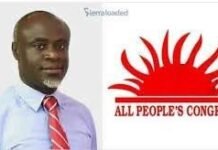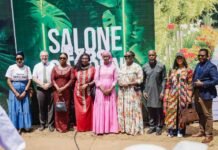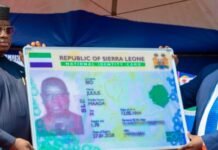By Jacob Macauley and Dr. Victor Moinina
In the vibrant streets of Freetown, where the hustle of daily life intertwines with the echoes of development, the paradoxes of Sierra Leone’s economy are starkly evident. Endowed with abundant natural resources, the nation grapples with entrenched poverty, deteriorating infrastructure, and a heavy reliance on taxation to fuel Governmental operations.
Sierra Leone’s economic narrative is one of missed opportunities. Despite the allure of its mineral wealth, including diamonds, iron ore, and rutile, mismanagement and corruption have hindered the transformation of resources into widespread prosperity. “Our natural endowments should be a blessing, but they’ve often turned into a curse,” laments Abdul Kamara, an Economics Professor at Fourah Bay College.
The crux of Sierra Leone’s economic dilemma lies in its tax-heavy revenue model. With tax revenues comprising nearly 16% of the GDP, the nation grapples with one of West Africa’s highest tax burdens. This dependency stems from a narrow economic base and limited avenues for income generation beyond taxation.
Critics argue that high taxes stifle entrepreneurship, discourage investment, and fuel the growth of an informal sector operating beyond the tax net.
Aminata Conteh, a local business owner, highlights the conundrum faced by small enterprises: “The tax rates are suffocating. It’s either evade taxes or face closure.”
However, proponents of robust taxation assert its necessity for funding vital public services and infrastructure development. Former Finance Minister, Jacob Saffa, underscored the indispensable role of taxes in nation-building, advocating for a balanced approach to revenue generation.
Despite efforts to broaden the tax base and enhance collection mechanisms, progress has been sluggish, marred by corruption and bureaucratic inefficiencies. The ongoing debate over taxation’s impact on economic growth underscores the complexity of Sierra Leone’s developmental challenges.
The recent inauguration of a $318 million airport terminal, funded through a public-private partnership, epitomizes both hope and controversy. While touted as a catalyst for economic advancement, critics question its affordability amid widespread poverty and fiscal strains.
The introduction of the Goods and Services Tax (G.S.T.) in 2010 further underscores Sierra Leone’s tax conundrum. Despite aiming to bolster domestic revenue, the G.S.T. has faced criticism for its burdensome impact on businesses and consumers alike. The National Revenue Authority’s enforcement tactics have drawn ire, exacerbating grievances against the tax regime.
Yet, defenders of the G.S.T. argue for its necessity in funding essential services and reducing reliance on foreign aid. Former NRA Commissioner-General, Dr. Samuel Jibao, supported the tax’s pivotal role in ensuring sustainable revenue streams for Governmental operations.
As Sierra Leone navigates the intricate interplay between taxation and economic growth, the path forward remains uncertain. A multi-faceted approach, encompassing tax reform, economic diversification, and governance enhancements, is imperative to surmounting the nation’s economic challenges.
Key Recommendations for Economic Revival:
1. Comprehensive Tax Reform: Review and simplify the tax system, considering reductions in the G.S.T. rate and exploring alternative revenue sources.
- Formalization of the Informal Sector: Incentivize informal businesses to formalize operations, expanding the tax base while providing support for compliance.
- Targeted Investment: Direct tax revenues towards strategic investments in infrastructure and critical industries to stimulate economic growth.
- Improvement of Public Services and Governance: Enhance service delivery and governance to foster public trust and ensure efficient utilization of tax revenues.
- Capacity Building and Taxpayer Education: Invest in training programs for tax officials and raise awareness among taxpayers to enhance compliance.
- Regional Cooperation: Collaborate with neighboring countries to harmonize tax policies and combat tax evasion.
Sierra Leone’s journey towards economic prosperity hinges on striking a delicate balance between revenue mobilization and fostering an environment conducive to business growth and citizen well-being. Through concerted efforts and prudent policies, the nation can harness its potential for sustainable, inclusive development.




